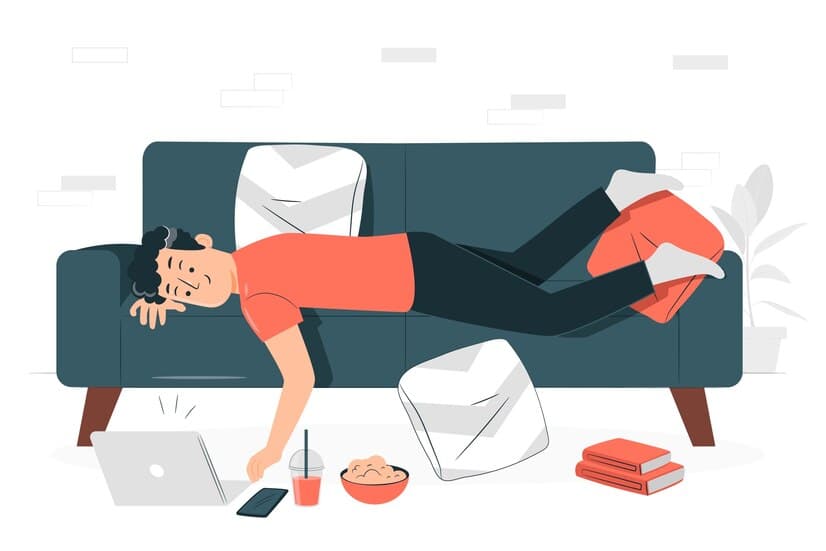Back to blog
What Are Causes of Laziness and Tiredness?

Many individuals are searching recently about the causes of laziness because it has become a common issue. It’s often confused with lethargy, even though their causes are different. Both can lead to psychological fatigue and frustration, and not finding a solution may lead to more serious problems like depression. So what are the main causes of laziness and what are the solutions? In this article, we’ll explore everything you need to know.
Causes of Laziness and Tiredness
Laziness and lethargy can both cause fatigue from even minimal effort, making it hard to complete simple tasks. But how do these two conditions differ?
Causes Of Lethargy
Studies indicate that lethargy can stem from pathological causes that are difficult to resist or control. For instance, some individuals manage their lethargy by adhering to strict diets like Carnivore or Keto, as their bodies struggle with most vegetables, fruits, and carbohydrates.
These causes may be linked to medical issues like irritable bowel syndrome or insulin resistance, and can mimic symptoms of vitamin and mineral deficiencies. It's important to conduct tests to identify these underlying causes, which differ significantly from mere laziness and are often beyond personal control.
Causes of Laziness and Sleepiness

Laziness and lethargy can be differentiated through comprehensive medical examinations. Laziness often stems from daily habits like excessive social media use or procrastination. To combat laziness, consider setting a regular exercise routine, such as Pilates or walking, to encourage movement. Additionally, creating a daily task schedule can help clarify your priorities and eliminate lazy habits for good.
Other Common Causes
You can determine the treatment of lethargy or laziness, fatigue and intense desire to sleep by knowing your daily and health habits. Here is a list of habits that lead to lethargy and laziness:
- Irregular sleep: insufficient or interrupted sleep can cause constant fatigue. Conditions like sleep apnea, insomnia, and irregular sleep patterns can greatly affect your energy levels.
- Lack of movement: lack of physical activity can lead to decreased stamina and increased feelings of lethargy. Exercise helps boost endorphins and energy levels.
- Eating unhealthy foods: diets high in sugar and processed foods can lead to energy crashes. Nutrient deficiencies, especially iron, vitamin D, and B vitamins, can also increase feelings of fatigue.
- Depression and anxiety: mental health conditions often manifest themselves in physical symptoms, including lethargy. The emotional weight of depression can drain energy, while anxiety can cause physical tension and fatigue.
- Psychological stress: chronic stress can lead to fatigue, whether it’s from the pressures of home, work, personal life, or everyday life.
- Chronic illness: conditions such as diabetes and hypothyroidism can cause persistent feelings of low energy. It’s important to consult a doctor if laziness is accompanied by other symptoms.
- Medications: some medications may list fatigue as a side effect. Reviewing these medications with your doctor can help determine if they are making the condition worse.
- Environmental factors: seasonal changes can trigger seasonal affective disorder (SAD) in many people during the fall and winter months, leading to laziness due to decreased exposure to sunlight.
- Poor air quality: such as living in areas with high pollution or allergens, can harm your energy levels.
Finding Solutions

There are many ways that help increase the feeling of energy and the desire to accomplish tasks, including following a healthy diet that suits your body after getting the necessary tests, and here are some other solutions:
- Get enough sleep at regular times
- Reduce intake of sugars, unhealthy foods, and hydrogenated oils
- Limit time on social media, especially in the morning and before bed
- Increase physical activity with exercises you enjoy, like walking, cycling, or dancing
- Start with small, achievable goals to build stamina and boost energy
- Focus on a balanced diet with whole foods, including fruits, vegetables, whole grains, and lean proteins
- Stay hydrated by drinking plenty of water and cutting back on caffeine
- Journal, meditate, practice deep breathing, or do yoga to reduce stress and enhance mental clarity
- Consider speaking with a therapist or counselor if stress or anxiety feels overwhelming
- Ensure your home is well-lit and ventilated to improve mood and energy
- Spend time outdoors, especially during the day, to benefit from natural sunlight
Healthy Meal Delivery
Eating healthy meals can enhance your quality of life and boost your daily energy and activity. At Calo, we make it easy for you by delivering satisfying, nutritious, and delicious meals right to your home or workplace. Our monthly subscription service allows you to choose your daily meal based on your mood.
FAQ
Does following a specific routine help combat lethargy and laziness?
Yes, maintaining regular sleep and wake-up times, along with setting daily tasks, can help you focus and overcome feelings of inactivity.
Can this condition cause physical pain?
Yes, excessive sitting and a constant urge to sleep can lead to joint and back pain. It's important to counteract these feelings by engaging in simple exercises or taking walks outside for fresh air.
Can depression cause laziness or lethargy?
Yes, depression can make you feel unmotivated, but by following the solutions, you can overcome this condition.
The causes of laziness and lethargy can affect lifestyle and mental health. By identifying the root causes and applying practical solutions, individuals can restore their energy and enhance their overall quality of life.. You can read more similar topics such as symptoms and diagnosis of gluten intolerance, causes of binge eating disorders, and other articles on the Calo blog.








